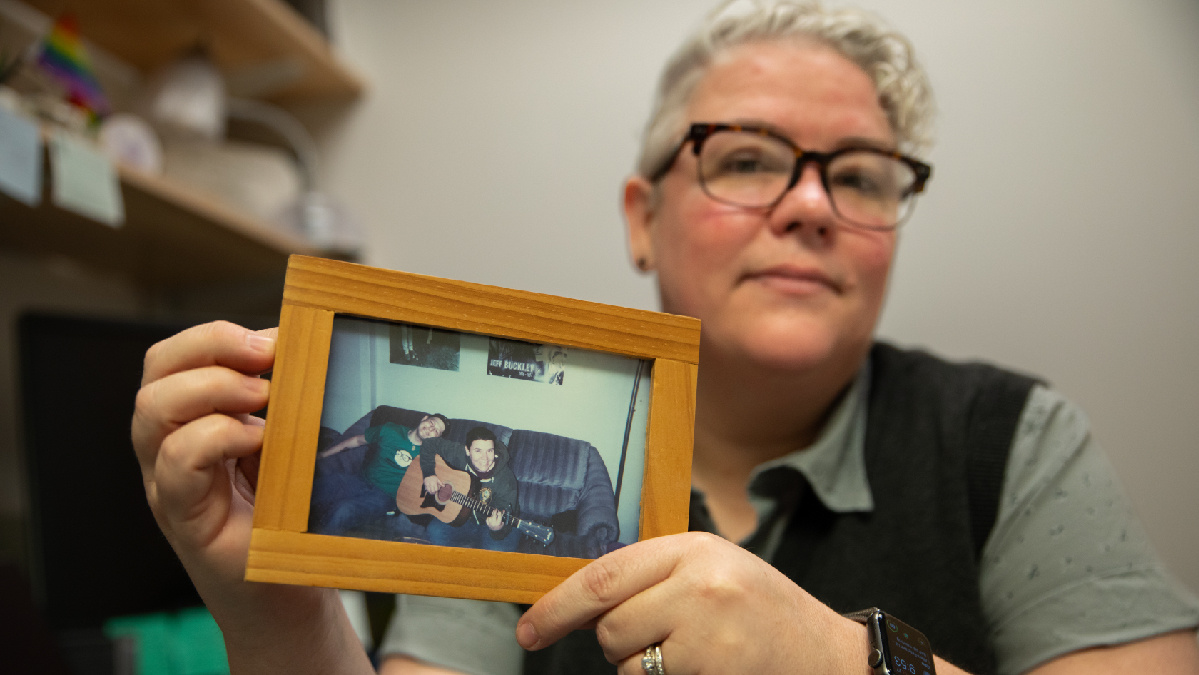Unveiling Cancer's Balancing Act: Exploring Protein Phosphatases and Therapeutic Strategies
03-29-2024

Brittany Allen-Petersen's journey into cancer biology is deeply personal, rooted in the profound loss of her friend Sean Robins to Ewing sarcoma—a tragedy that ignited her unwavering commitment to understanding and combating this relentless disease. Ewing sarcoma is a type of tumor that forms from a certain kind of cell in bone or soft tissue.
As an assistant professor of biological sciences at Purdue University's College of Science, Allen-Petersen's research delves into the intricate mechanisms underpinning cancer progression, with a focus on unraveling the mysteries of protein phosphatases.
Protein phosphatases function as natural “off switches” for several pro-tumorigenic signaling pathways. Allen-Petersen seeks to decipher the consequences of phosphatases dysregulation on tumor growth, particularly in pancreatic and lung cancers, where therapeutic options remain limited. Her journey at Purdue reflects a commitment to collaborative inquiry, where diverse scientific interests converge to drive innovation and discovery.
In cancers like pancreatic and lung cancer, oncogenic mutations lead to the constant activation of signaling pathways that drive cancer growth, while simultaneously suppressing the natural off switches (phosphatases) of these same pathways. The net effect is rapid tumor growth. By studying these dysregulated phosphatases, she aims to unravel their consequences and explore therapeutic avenues to reactivate them and tip the scales back to a tumor suppressive state. This research is particularly critical given the limited therapeutic options, primarily chemotherapy, available for these deadly cancers. Through her investigations, Allen-Petersen has identified the potential of phosphatases as antitumor agents, with promising results showing tumor reduction with minimal toxicity to normal cells.
“In the realm of cancer research, the focus has predominantly been on understanding the ‘on switches’ driving cancer,” said Allen-Petersen. “However, the role of critical ‘off switches’ like phosphatases remains largely understudied. Our work aims to bridge this gap by shedding light on the significance of these off switches in cancer biology,” she added.
By uncovering the mechanisms behind their function and dysregulation, phosphatases could pave the way for innovative therapeutic interventions that target both the "on" and "off" aspects of cancer pathways. This untapped potential offers a promising avenue for developing more effective and targeted treatments, addressing the complexities of cancer progression in ways previously unexplored. As she delves deeper into this understudied aspect of cancer biology, Allen-Petersen envisions a future where the balance between on and off switches holds the key to unlocking new frontiers in cancer therapy.
One aspect of her diverse research program focuses on a recent discovery made by the Allen-Petersen lab that phosphatases play a critical role in regulating how tumors replenish themselves. These studies focus on the phenomenon of macropinocytosis—a process by which pancreatic cancer cells scavenge nutrients from their environment to fuel growth. Building on her earlier discoveries, Allen-Petersen's team has identified a promising pathway where their phosphatase of interest acts as a potent inhibitor of macropinocytosis, offering a novel therapeutic strategy to disrupt cancer cell nutrient acquisition. These findings have the potential to significantly drive cancer-specific cell death, as cancer cells, and not normal cells, heavily rely on this pathway for survival. This work has been funded by both the Concern Foundation and the Pancreatic Cancer Action Network; the latter of which Allen-Petersen has participated in volunteer efforts for over a decade.
Securing an internal Purdue grant to advance this research, Allen-Petersen's work holds immense promise for the future of cancer treatment. Her journey at Purdue embodies the university's ethos of collaborative innovation, where scientific inquiry transcends disciplinary boundaries to address pressing societal challenges. As she navigates the complexities of cancer biology, Allen-Peterson's discoveries illuminate pathways towards effective cancer therapy, offering hope to countless individuals impacted by this devastating disease.
In her molecular biology classes, Allen-Petersen invites students to introspect, urging them to reflect on personal encounters with cancer—a poignant reminder of the human toll underlying their scientific pursuits. Her own reminder- a photo of herself and Sean as teens, is displayed on a shelf in her office.
"He passed away shortly before his 23rd birthday. His death fundamentally changed me as a person," she reflects. "His story underscores the gravity of our research, it’s what drives me.”
About the Department of Biological Sciences at Purdue University
Purdue Biological Sciences is the largest department in the Life Sciences at Purdue University. We are dedicated to pioneering scientific discoveries and transformative education at the cutting edge of innovation. From molecules to cells, from tissues to organisms, from populations to ecosystems - we bring together multiple perspectives, integrating across biological scales to advance our understanding of life and tackle the world’s most pressing challenges. Learn more at bio.purdue.edu/.
Source: Brittany Allen-Petersen, Assistant Professor in the Department of Biological Sciences at Purdue University
Writer: Alisha Referda, Communications Specialist